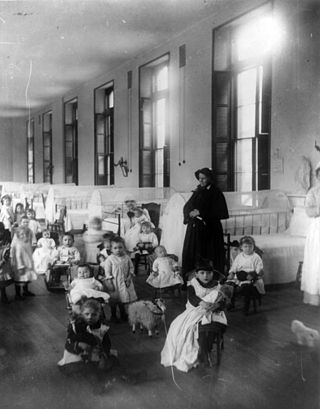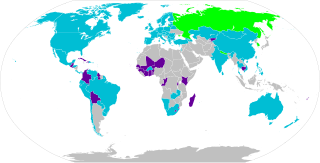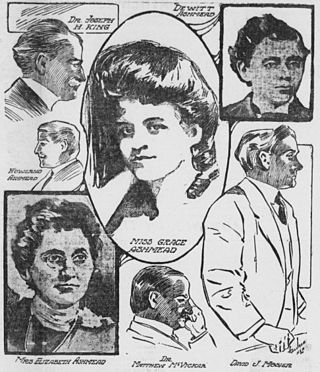
Adoption is a process whereby a person assumes the parenting of another, usually a child, from that person's biological or legal parent or parents. Legal adoptions permanently transfer all rights and responsibilities, along with filiation, from the biological parents to the adoptive parents.
The Guardian Children's Fiction Prize or Guardian Award was a literary award that annual recognised one fiction book written for children or young adults and published in the United Kingdom. It was conferred upon the author of the book by The Guardian newspaper, which established it in 1965 and inaugurated it in 1967. It was a lifetime award in that previous winners were not eligible. At least from 2000 the prize was £1,500. The prize was apparently discontinued after 2016, though no formal announcement appears to have been made.
The Nestlé Children's Book Prize, and Nestlé Smarties Book Prize for a time, was a set of annual awards for British children's books that ran from 1985 to 2007. It was administered by BookTrust, an independent charity that promotes books and reading in the United Kingdom, and sponsored by Nestlé, the manufacturer of Smarties candy. It was one of the most respected and prestigious prizes for children's literature.
The international adoption of South Korean children was at first started as a result of a large number of orphaned mixed children from the Korean War after 1953, but later included orphaned Korean children. Religious organizations in the United States, Australia, and many Western European nations slowly developed into the apparatus that sustained international adoption as a socially integrated system. This system, however, is essentially gone as of 2020. The number of children given for adoption is lower than in comparable OECD countries of a similar size, the majority of adoptees are adopted by South Korean families, and the number of international adoptees is at a historical low.
Holt International Children's Services (HICS) is a faith-based humanitarian organization and adoption agency based in Eugene, Oregon, United States, known for international adoption and child welfare. The nonprofit works in thirteen countries, including: Cambodia, China, Colombia, Ethiopia, Haiti, India, Mongolia, Philippines, South Korea, Thailand, Uganda, Vietnam, and the United States. This work includes a range of services for children and families including efforts in nutrition, education, family strengthening, orphan care, foster care, family reunification, and child sponsorship. The organization's stated mission is to seek a world where every child has a loving and secure home.
International adoption is a type of adoption in which an individual or couple residing in one country becomes the legal and permanent parent(s) of a child who is a national of another country. In general, prospective adoptive parents must meet the legal adoption requirements of their country of residence and those of the country whose nationality the child holds.

Trafficking of children is a form of human trafficking and is defined by the United Nations as the "recruitment, transportation, transfer, harboring, and/or receipt" kidnapping of a child for the purpose of slavery, forced labour, and exploitation. This definition is substantially wider than the same document's definition of "trafficking in persons". Children may also be trafficked for adoption.
In the United States, adoption is the process of creating a legal parent–child relationship between a child and a parent who was not automatically recognized as the child's parent at birth.
Interracial adoption refers to the act of placing a child of one racial or ethnic group with adoptive parents of another racial or ethnic group.

Beulah George "Georgia" Tann, was an American social worker and child trafficker who operated the Tennessee Children's Home Society, an unlicensed adoption agency in Memphis, Tennessee. Tann used the home as a front for her black market baby adoption scheme from the 1920s to 1950. Young children were kidnapped and then sold to wealthy families, abused, or—in some instances—murdered. A state investigation into numerous instances of adoption fraud led to the closure of the institution in 1950. Tann died of cancer before the investigation made its findings public.

David Mark Smolin is a professor of law at Cumberland School of Law in Birmingham, Alabama where he is the Harwell G. Davis Chair in Constitutional Law, director for The Center for Children, Law, and Ethics, former director of the Center for Biotechnology, Law, and Ethics, and faculty advisor for the Law, Science and Technology Society.
Child laundering is a tactic used in illegal or fraudulent international adoptions. It may involve child trafficking and child acquisition through payment, deceit or force. The children may then be held in sham orphanages while formal adoption processes are used to send them to adoptive parents in another country.
From 1996 to 2007, Guatemala was one of the major providers for children for international adoption, peaking at 5,577 children adopted in 2007. Since reforms in 2007–08, aimed at combating extensive corruption in the adoption process, the numbers have fallen drastically. However, the numbers of children placed with Guatemalan families has remained roughly constant at around 250 per year both before and after the new legislation.

The Hague Convention on Protection of Children and Co-operation in Respect of Intercountry Adoption is an international convention dealing with international adoption, child laundering, and child trafficking in an effort to protect those involved from the corruption, abuses, and exploitation which sometimes accompanies international adoption. The convention has been considered crucial because it provides a formal international and intergovernmental recognition of intercountry adoption to ensure that adoptions under the convention will generally be recognized and given effect in other party countries.
Adoption in Australia deals with the adoption process in the various parts of Australia, whereby a person assumes or acquires the permanent, legal status of parenthood in relation to a child under the age of 18 in place of the child's birth or biological parents. Australia classifies adoptions as local adoptions, and intercountry adoptions. Known child adoptions are a form of local adoptions.
Child abduction or child theft is the unauthorized removal of a minor from the custody of the child's natural parents or legally appointed guardians.

Child harvesting or baby harvesting refers to the systematic sale of human children, typically for adoption by families in the developed world, but sometimes for other purposes, including trafficking. The term covers a wide variety of situations and degrees of economic, social, and physical coercion. Child harvesting programs or the locations at which they take place are sometimes referred to as baby factories or baby farms.
Adoption fraud, also known as illegal adoption, can be defined as when a person or institute attempts to either illegally adopt a child or illegally give up a child for adoption. Common ways in which this can be done include dishonesty and bribes.
Child-selling is the practice of selling children, usually by parents, legal guardians, or subsequent custodians, including adoption agencies, orphanages and Mother and Baby Homes. Where the subsequent relationship with the child is essentially non-exploitative, it is usually the case that purpose of child-selling was to permit adoption.
The following outline is provided as an overview of and topical guide to adoption:





